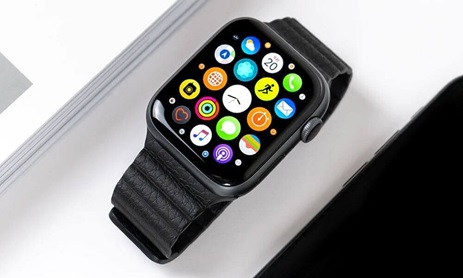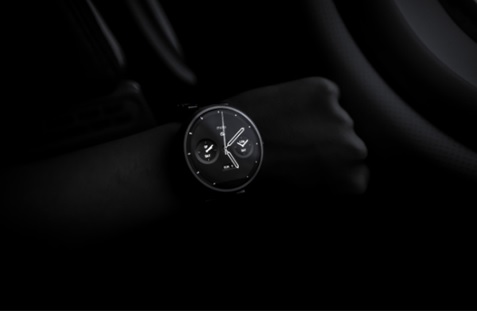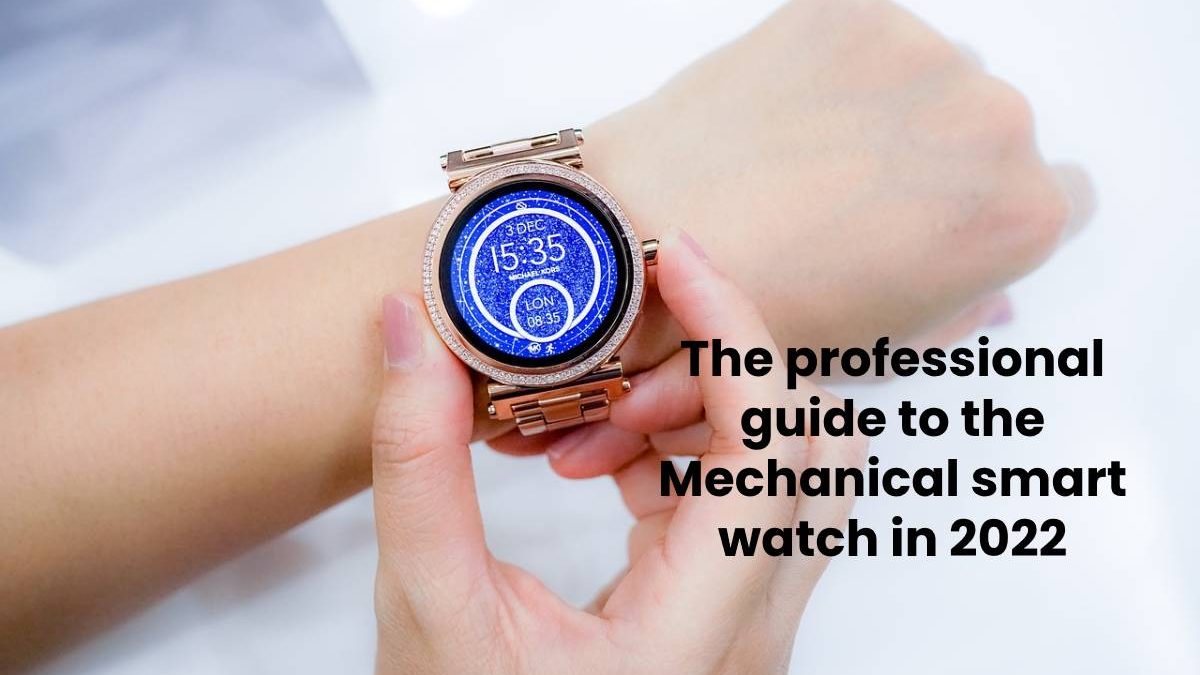The Mechanical smart watch in 2022
How Big Is the Smart Watch Market Vs Traditional Mechanical Watch?
The smart watch was a hot topic in 2015. During the Quartz Crisis, the new technology almost killed pocket watches. Since then, a new generation of wristwatches has emerged. While the new timepieces offer a wide range of digital functions, they have limited capabilities when it comes to timekeeping. In addition, they are not always

compatible with what the wearer is wearing, unless he’s wearing a traditional wristwatch, which often requires an extra step. However, smartwatches have created a whole new market for connectivity and innovation.
Although the smart watch has already gained popularity, its future is far from clear. Though the market is booming worldwide, it will be difficult for traditional mechanical watchmakers to compete. Despite its many benefits, a smartwatch requires frequent charging and requires a lot of maintenance. Compared to a mechanical wristwatch, a smartwatch will need to be wound once in a while.
While the smartwatch has all of the bells and whistles, its cost is prohibitive for most people. These watches are not outrageous, but they are inaccessible to most people. The only downside of these high-end models is that they need to be renewed every three to four years, requiring a $1,500 investment. Fortunately, the market for a mid-range smartwatch is huge, and Apple, as a company, has already started in this segment.
While the smartwatch may not kill the traditional watch market, they certainly create an ancillary industry that will be influenced by the new technology. The Swiss watch industry was affected by the tech invasion, but the new generation of watch-buyers don’t want to spend their time away from the internet. If smartwatches are a threat to the traditional watch industry, tech companies will fix these issues.
The smartwatch is a hot product in the market. It has already surpassed the traditional mechanical watch. Despite its popularity, there are still many advantages to using a smartwatch. They can be more convenient to use than a conventional mechanical watch. They don’t look as stylish, and they do not require a lot of charging. They also last a lot longer than the smartwatch.
Although smartwatches have many benefits, they’re not appropriate for everyday wear. Despite their advantages, they are unable to replace the traditional mechanical watch. For example, they do not have the same aesthetics. While they’re not as fashionable as the classic watches, the traditional Swiss watches are more practical and are not as bulky. The smartwatch market is growing by 20% per year, which is a significant amount.
The smartwatch market is growing and a smartwatch is an increasingly popular accessory. As the popularity of the smartwatch grows, the demand for mechanical watches could be diminished. There is a need to find a balance between the two. In the meantime, a smartwatch is an extension of the wearer’s personality. The latter’s appearance is an important factor in buying a smartwatch.
With their obvious bells and impressive global sales figures, the smartwatch has become an important part of our lives. The future of mechanical watches is still uncertain, but the trend of smartwatches is increasing, as more people are introducing the concept to their loved ones. In the meantime, they might be a good reason to switch from your current mechanical watch to a smart one. While it’s possible that the two markets will coexist, it will probably be a long way off for the traditional ones.
In the past year, smartwatches have outsold traditional watches, and the numbers are predicted to double by 2020. But Michael Sims, the owner of Hook + Gaff Watch Company, argues that the best thing about traditional watches is the lack of features. Those with the luxury timepiece will likely keep their timepieces. The new smart watches will be expensive and can’t be bought in stores.
Who Made the First Mechanical Smart Watch Hybrid?

One company that has dabbled in the world of smartwatches is Frederique Constant. She’s developed an exceptional smartwatch, the Hybrid, combining the best of both technological and mechanical worlds. Although the company’s first watch didn’t quite make it to the big leagues, it has enough innovation to stand up to the giants of the smartwatch market. So, who made the first mechanical-smart watch hybrid?
Kairos is a Swiss company called Frederique Constant. Its name comes from the ancient Greek word ‘kairos’, which means the perfect time to act. The company’s founder, Peter Stas, founded the company in 2008 and named it after this idea. The hybrid watch combines a mechanical watch movement with smart features. Its design is designed to appeal to young, tech-savvy consumers. The dial of the hybrid looks a lot like a PCB (print circuit board).
The watch’s dial looks like a PCB (print circuit board). Its movement is powered by a quartz-powered battery and is equipped with a GPS-based navigation system. The watch’s app also shows movement data and provides a daily summary of the user’s activity. The hybrid can be used for fitness tracking. It can be used with an iPhone and an iPad to track heart rate and calories burned.
A more advanced mechanical smart watch hybrid is Kairos. This timepiece is not available in stores yet, but the company has begun accepting pre-orders and expects to begin shipping by December. The Hybrid watch has true self-winding movements and a transparent OLED display. The device is a fusion of technology and mechanical movement. It’s billed as the first mechanical smart watch hybrid.
The Hybrid watch uses quartz technology. It also features a second time zone and activity tracking. It has the same features as the Apple Watch. Its dial features guilloche decoration and a black-and-white hour-marker pattern. Unlike Apple’s sleek, minimalistic design, the Hybrid is a stylish, high-performance hybrid with smart functions. It’s the antithesis of the Apple Watch.
The Kairos Hybrid has a 46mm case. It has a Swiss automatic movement with 25 jewels. Its battery life is 42 hours. The hybrid has a dual-time zone, and the Manufacture is one of the first hybrids to use a smartphone with this functionality. The Manufacture has a mobile app that connects to the Kairos. The Manufacture Watch is an innovative device that combines a mechanical movement with a touchscreen. It’s the only company to have managed to do so.
The Kairos is not your typical smartwatch. It combines quartz technology with mechanical movement. It communicates with a smartphone app through Bluetooth. However, it also has an app that offers health tips based on its stats. The Fitbit Hybrid also has a built-in GPS. If you’re a runner, you can monitor your fitness levels and make an informed decision with your watch.
The Kairos is one of the most innovative hybrids on the market. It has a 46mm case with a Swiss automatic movement, which beats at 28800 bph. The Kairos’ transparent OLED screen is another unique feature. The back of the watch features a touchscreen, Android Wear OS, and a GPS-enabled world time. The hybrid has several other features, but the most intriguing are its dual-time zone.
The Kairos Hybrid Watch is an excellent example of a mechanical-smartwatch hybrid. It features a 46mm case and a Swiss automatic movement with 25 Jewels. The Hybrid is a limited edition model, and only 888 pieces will be produced. Its price is $3,595. The Limited Edition version costs $3,595. It comes with a GPS-enabled world time function.
While most of the mechanical smart watches have a modern appearance, the Frederique Constant Hybrid watch combines classic design with connected watch capabilities. The ad Maiora is a 42mm case that looks traditional. The dial has an analogue date display at 6 o’clock and a digital module for indicating certain smart functions. If you’re looking for a mechanical-smartwatch hybrid, look no further than Frederique Constant.
How to Make a Mechanical Watch Into a Smart Watch

Traditionally, a mechanical or quartz watch is a very simple, old-school gadget with an analog dial. Some quartz watches have digital dials, but that doesn’t make them a smartwatch. A smartwatch has a touchscreen and connects to an app on a smartphone. This technology has been around for several years. The first smartwatch, the Seiko Data 2000, was released in the 1980s. The Seiko’s datawatch connected to a laptop and synced with an external keyboard by docking. However, the popularity of smartwatches started to take off in the late 2000s.
The technology used to make a smartwatch works by attaching a tiny computer to a wristwatch. The computer uses an algorithm to determine the time. The algorithm uses the movement of the wrist to calculate how much energy is in the wrist. If you aren’t a jogger, the Apple Watch won’t do the trick. But if you’re a watch lover and want to make your watch smart, there is a way to turn your mechanical watch into a smartwatch!
DIY smartwatch kits usually include multiple Printed Circuit Boards (PCBs) containing a processor board, a display unit, and auxiliary PCBs. You connect these PCBs together with a microchip and add a battery to make your watch smart. Afterward, you need to add an LED display and a smartwatch app. After that, you’re ready to install the hardware.
A mechanical watch with a GPS function can be converted into a smart one by installing a small smartwatch module. A smartwatch module can be inserted into the existing analogue mechanism. In order for the new module to work properly, it needs to fit in the case. Some manufacturers have developed interchangeable modules, such as the TAG Heuer Connected Modular 45. A DIY smartwatch kit will contain multiple PCBs, an OLED display, a watch housing, and a strap.
A mechanical watch is the most ancient type of timepiece. It was the first to be popular and is a symbol of prestige. They celebrate the art of human craftsmanship, and the best are displayed in museums. Since they do not require batteries, they are perfectly suitable for everyday use. Even if you’re not a fan of the Apple Watch, you can buy an automatic mechanical watch. This allows you to enjoy all of the benefits of the smartwatch without sacrificing the traditional timepiece.
Many DIY smartwatch kits include multiple Printed Circuit Boards (PCBs) that connect the display unit, processor board, and battery. These PCBs form the electronic heart of the smartwatch. The final step is to add an OLED display. You can find the LED display on an old mechanical watch. You can also build a DIY smartwatch by attaching a simple, plastic strap.
There are a couple of reasons to consider making a mechanical watch into a smart watch. It’s more affordable than a smartwatch and has a better design than a smartwatch. Unlike a smartwatch, an automatic mechanical watch does not need batteries. Instead, the watch collects energy by using a mechanical weight that moves with the wearer’s wrist. The hairspring in the back of the watch collects the energy from this movement and stores it in a regulator.
Once you have the parts for a DIY smartwatch, you’ll need to connect the components. The DIY smartwatch is comprised of multiple Printed Circuit Boards, including the processor board, display unit, and auxiliary PCBs. The battery and LED display are the electronic heart of the smartwatch. By connecting these PCBs, you can build a DIY smartwatch with a mechanical watch.
The first major disadvantage of a smartwatch is its need to be constantly charged. The battery of a smartwatch requires a daily charge, which can rob it of its data. Fortunately, most modern mechanical watches are built to withstand such high-magnet fields, but still, the magnetic field of a metal detector will cause the watch to deregulate. Therefore, you can easily convert a traditional mechanical watch into a smart watch with a DIY kit.
Related posts
Sidebar
Recent Posts
The Best Forex Brokers for Beginners
Since COVID-19 first popped up, interest in the forex market has increased dramatically. Knowing how to get involved with minimal…
Maximizing Success: The Symbiosis of Dedicated Software Development Teams and Product Design Services
The Symbiosis of Dedicated Software Development Teams and Product Design Services In the rapidly evolving landscape of technology, businesses aiming…



